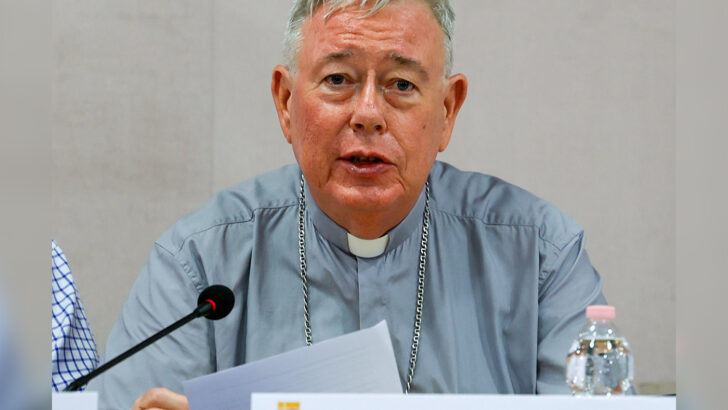Tyler Arnold
Cardinal Jean-Claude Hollerich praised the boldness and the faithfulness of the Catholic Church in Africa after a pilgrimage the prelate took to the west African country Benin last week, particularly after the continent spoke out against the Vatican’s decision to bless same-sex couples last December.
“The Church in Africa is a Church that knows its own value and is not afraid to speak,” Cardinal Hollerich, a leading organiser of the Vatican’s Synod on Synodality, told La Croix International, a French Catholic newspaper.
Cardinal Hollerich, who serves as the relator general of the synod, participated in the annual Marian pilgrimage to the Notre-Dame d’Arigbo cave in Dassa-Zoumè.
The prelate told La Croix that the Church in Africa is one that is “alive and full of faith” and that he came to “learn”, adding: “I am looking at this Church as a pastor from a European Church to see how we can move forward in the future”. He noted the “joy” seen in the celebrations in Africa, which he contrasted with European celebrations that he said “are sometimes very dull”.
Participate
“People do not always participate with their hearts,” the cardinal, who has served as Archbishop of Luxembourg since 2011, explained. “It becomes merely a ceremony — a rite. However, here in Africa, what is done is magnificent. Even the pilgrimage I am attending shows this participation and deep faith in Africa. In Europe, we speak more of tradition than of faith. But tradition is only understood when there is faith to interpret it. So, it is beautiful to see the faith as it is lived in Africa.”
The Catholic hierarchy in Africa often leans more traditional and conservative than the hierarchy throughout the Western world. Earlier this year, African bishops declined to implement a Vatican directive that sanctioned “spontaneous” pastoral blessings for “same-sex couples” and other couples in “irregular situations”.
The Vatican declaration, Fiducia Supplicans, maintained a ban on liturgical blessings for same-sex couples, did not allow recognition of civil unions, and instructed the clergy to not take any actions that could make the blessings appear like a marriage. Less than a month later, the Symposium of Episcopal Conferences of Africa and Madagascar issued a statement that said there would be “no blessing for homosexual couples in the African churches”.
Pope Francis later said Africa was ‘a special case,’ because ‘for them, homosexuality is something ‘ugly’ from a cultural point of view; they do not tolerate it’”
Cardinal Víctor Manuel Fernández, who heads the Dicastery for the Doctrine of the Faith, had earlier granted leeway to Church hierarchy in enforcing the directive, saying: “It’s proper for each local bishop to make that discernment”.
Pope Francis later said Africa was “a special case,” because “for them, homosexuality is something ‘ugly’ from a cultural point of view; they do not tolerate it”.
Hollerich addressed the issue of the upcoming Synod on Synodality, which is scheduled to meet for its concluding session from October 2 to October 27, at which point officials will produce a final report to deliver to Pope Francis.
“My role … is to ensure that everyone is heard, that there are no political machinations within the Church, but that all the people of God, from all continents, are listened to and that the entire Church can journey together,” Hollerich said in the interview.
Damaging
An Africa cardinal who led the continent’s bishops in rejecting blessings for same-sex couples called it “damaging” to the synodal process convened last January.
The timing, the moment when this document was published, was damaging for the synodal process”
Cardinal Fridolin Ambongo Besungu of Kinshasa in the Democratic Republic of Congo said that because the release of Fiducia Supplicans, which authorised non-liturgical blessings of persons involved in same-sex relationships, came between the two Synods of Bishops on Synodality, it created the misleading notion that the document was the fruit of synodal discussions.
“The timing, the moment when this document was published, was damaging for the synodal process,” Ambongo said earlier this year. He was speaking at a press conference during the January 24-26 joint meeting between representatives of the Symposium of Episcopal Conferences of Africa and Madagascar (SECAM) and the Council of European Bishops’ Conferences (CCEE) held in Nairobi, Kenya.
Discredit
The 64-year-old cardinal, who also serves as president of SECAM, said the timing of the document’s release “brought discredit to the synod, to synodality”.
He explained: “In the first session, the synod dealt with all these issues, but the synod did not decide. So the publication of this document, between the two sessions of the synod, was seen by most people as if it was the fruit of the synod, when it had nothing to do with the synod.”
Ambongo highlighted that many people already saw the synod’s first session as at least indirectly signifying “approval of homosexual couples and homosexuality”, which, he added, goes against both African culture and the fundamental teachings of the Catholic faith, in conflict with the Pope’s contention that the objection made by Africa was purely on cultural grounds.


 Cardinal Jean-Claude Hollerich of Luxembourg speaks during a news conference in Rome July 29, 2024, on the occasion of the XIII International Pilgrimage of Altar Servers to Rome. Cardinal Hollerich is president of Coetus Internationalis Ministrantium, the association of altar servers that hosted the pilgrimage along with the German bishops’ conference. Photo: CNS/Lola Gomez
Cardinal Jean-Claude Hollerich of Luxembourg speaks during a news conference in Rome July 29, 2024, on the occasion of the XIII International Pilgrimage of Altar Servers to Rome. Cardinal Hollerich is president of Coetus Internationalis Ministrantium, the association of altar servers that hosted the pilgrimage along with the German bishops’ conference. Photo: CNS/Lola Gomez 